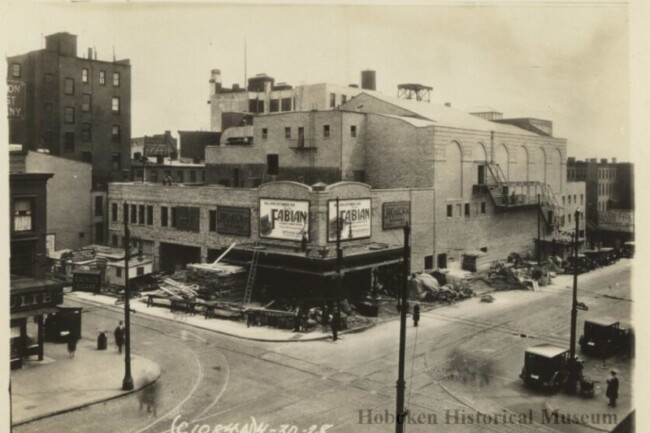A recent headline had Hoboken residents taking note: an arts and entertainment venue would now be a part of the plans for a redevelopment effort in downtown Hoboken. While the concept sounds new to modern ears, Hoboken was once a destination for the performing arts and boasted dozens of entertainment venues, from vaudeville halls to early movie theaters. On December 20th, the Hoboken City Council unanimously approved the re-zoning of the Fabian Arts District Redevelopment Plan. Read on to learn more about the new plans and how they fit into Hoboken’s history.
Historical Context
The name Fabian comes from Hoboken’s past. A 2016 article in Hmag, from the Hoboken Historical Museum, discusses Hoboken’s history of performing arts venues in town, dating back to the late 1800’s. The article, called Seacoast of Bohemia: a Brief History of Theatre in Hoboken, describes Hoboken’s past as a destination for artists and performers. The title comes from a 1929 book, Seacoast of Bohemia, which was a history of Hoboken’s theatrical past.
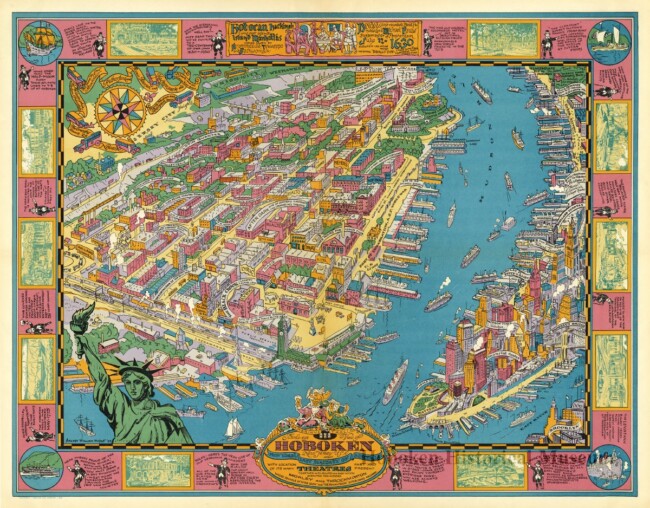
^ ”Bird’s Eye View of Hoboken” from Seacoast of Bohemia (1929). Photo credit: Hoboken Historical Museum
“From the late 1800s through early 1900s, prosperous Hoboken supported dozens of local theaters, variety halls, and, after the turn of the century, movie houses — not only on Washington and Hudson Streets, but scattered throughout the city. While many venues changed hands through the years, they drew capacity crowds to enjoy live entertainment, from low-brow burlesque to high-brow drama and light opera, according to news clippings from the time.”
“The Fabian, which hosted vaudeville and variety shows as well as movies, from 1928 until the mid-1960s,[was] at the corner of Washington and Newark Streets.” A 1987 exhibit at the Hoboken Historical Museum took a deep dive into this part of Hoboken’s history, sharing photos, articles, and other ephemera from the city’s past. Museum founder Jim Hans wrote a 48-page pamphlet to accompany the exhibition, which was the museum’s second exhibit at the time.
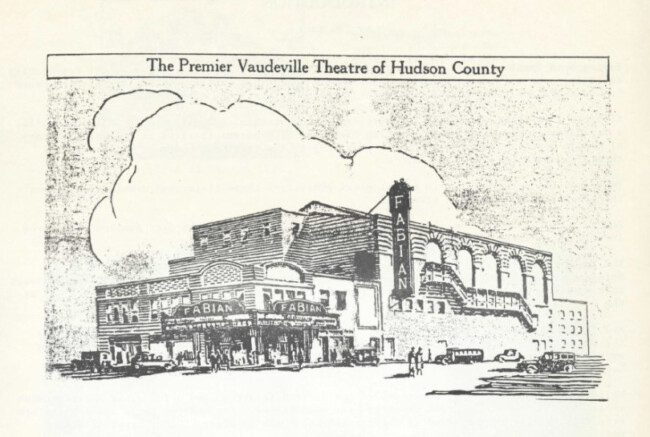
^ Illustration of the Fabian Theater from the 1987 exhibit. Photo credit: Hoboken Historical Museum
Jim Hans wrote: “The Fabian Theatre opened August 2, 1928, the day after the above drawing appeared in the Jersey Observer. Besides first-run motion pictures, many local entertainers played here, including the young Frank Sinatra. James Cagney was said to have appeared on the Fabian stage as well, in his early days as a hoofer. Although the 3,500 seat theatre was built after the 1923 property map (next page) was published, we entered the name here to show how the theatre, Hoboken’s largest, took the place of 9 average-size lots (number 9 through 17). Properties on lot numbers 18, 19, and 20 (still shown here) were removed in 1928 to widen Newark Street. Notice also there was a stable or garage fronting Court Street, on log number 72. The Fabian was the last theatre in Hoboken to close, lasting until around 1964-65.”
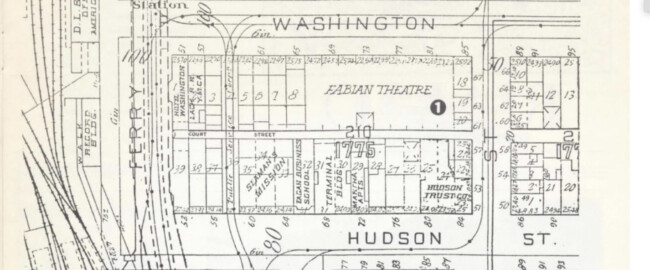
^ A 1923 map showing the location of The Fabian Theater. Photo credit: Hoboken Historical Museum
The location of the original Fabian Theater has been many things over the years and is currently home to a CVS. So while this proposal is new, the concept of an arts facility at the intersection of Newark and Washington isn’t.
Read More: Mikie Squared in Hoboken Has Closed
What We Know
The proposal for the Fabian Arts District is part of a larger plan to redevelop the area around Washington Street and Observer Highway. In May 2020, an L-shaped plot of land in downtown Hoboken was designated as an Area in Need of Rehabilitation.
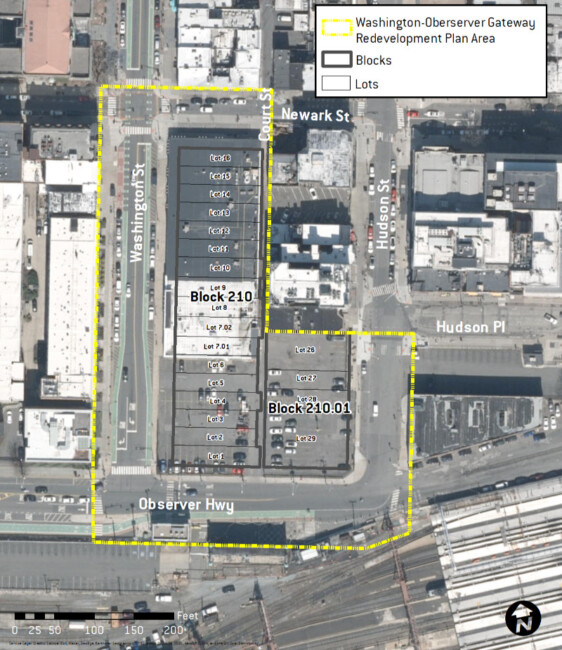
Hoboken city officials conducted public outreach sessions in 2022 and early 2023, seeking feedback from residents about what could go in the space. This resident feedback plus other work done by the planning department was presented at a November 13th City Council meeting. The proposal passed with a unanimous vote on the first reading — and the re-zoning was unanimously approved at the December 20th City Council meeting
The Hoboken Girl connected with R.J. Theofield in the city’s planning office for Hoboken to learn more about the proposal.
HG: How did the performing arts venue go from a recommendation to a requirement?
RT: Following the March 15, 2023 public meeting for the Fabian Arts District (FAD) Redevelopment Plan, the City revised the Community Benefit Provisions to include additional requirements that address the community’s & City’s high priority goals and objectives including the call for entertainment space. These revisions included replacing a “Performing Arts Center” requirement under Incentive Development, with an “Entertainment Space designed to accommodate Live Music or Performing Arts” under Baseline Development and the addition of new community benefits like workforce housing, administrative office space for social services, and others as identified through the public engagement process. The March 2023 draft Plan anticipated a Performing Arts Center with large theater-style seating, stages, and back-of-house spaces, which would have made these other incentives less feasible than the November 2023 Plan which requires an entertainment space, which is defined in the Plan as “any physical establishment, however designated, that includes dedicated space for live music or entertainment, the preparation, sale, and/or service of food and beverages to the public, and features live music or other entertainment”. As a result of these changes, the revised draft Plan addresses the community’s desire for an entertainment space in the area and further adds to the community benefits that will be provided through any future redevelopment of the site.
HG: Are there any builders, developers, arts groups, or other backers affiliated with the project at this time?
RT: Not at this time. New Jersey redevelopment law requires a redevelopment plan be adopted before the City can designate a developer for the site.
HG: Can you elaborate a bit more on how this project fits in with the other developments happening at the southern end of Hoboken? in particular the Hoboken Terminal redevelopment project? This is adding a lot of housing, including affordable housing, which is good, but that’s a lot more people.
RT: The FAD Redevelopment Plan requires the provision of transportation improvements and new public spaces that will build upon and connect to the improvements planned at Hudson Place and Hoboken Terminal resulting from the nearby Hoboken Yard redevelopment project. For example, a mid-block pedestrian connection between Hudson Street and Washington Street and a widened Court Street will improve pedestrian circulation between Hoboken Terminal and Washington Street. The Redevelopment Plan also integrates space and maintenance needs of the Rebuild By Design “resist” structure planned to be installed at the intersection of Washington Street and Observer Highway into future development.
Once the redevelopment plan is adopted and finalized, an evaluation of impacts to the City’s infrastructure would be submitted by a developer as part of a project proposal and reviewed by the City.
The Redevelopment Plan requires a minimum of either approximately 37,000 square feet or 60,000 square feet of non-residential space. Supermarkets are conditionally permitted by the FAD Redevelopment Plan, but it is not a requirement. Specific non-residential uses will be included in the redevelopment project proposal submitted by a developer, after a plan is adopted.
HG: Did Hoboken look to other locations that have added a new arts venue?
RT: The City’s project consultant analyzed a number of arts venues (e.g., White Eagle Hall in Jersey City) to determine the feasibility of a performing arts space. Hoboken is blessed by talented artists and performers who call Hoboken home and while we have Mile Square Theatre in uptown Hoboken, downtown Hoboken does not have a live venue for music, dance, etc. Having a downtown space where artists, musicians, dancers, etc, can showcase their talents will add to the vibrancy of our City and help the local economy by providing additional employment and business opportunities.
Modern Context
Hudson County is a draw for its many attractions and amenities. A recent study released by the nonprofit group Americans for the Arts examined cities nationwide to learn more about spending and the arts. The study, called The Arts + Economic Prosperity 6 (AEP6), is the sixth national study of the economic impact of the arts and culture industry. Information from the Hudson County Office of Cultural and Heritage Affairs was also included. Hudson County generated $53.6 million in economic activity and $14.6 million in local, state, and federal taxes, and 1,057 jobs were created, according to NJ.com.
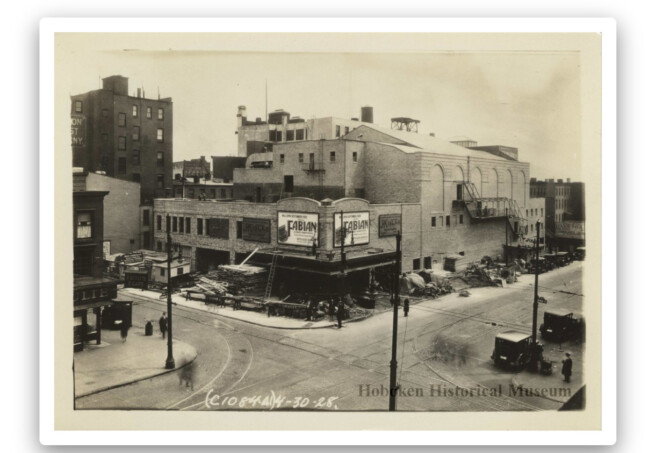
^ The Fabian Theater, April 1930. Photo credit: Hoboken Historical Museum
What organization wouldn’t want to be a part of that? The Hoboken Girl spoke with Ben LoPiccolo CEO/partner at BLDG-UP, who has been involved in several real estate projects in Hudson County, including the development of White Eagle Hall in Jersey City. We spoke with Ben about his experience starting a performing arts venue in Jersey City.
“We started working on White Eagle Hall in 2014 and at the time, the neighborhood was pretty desolate. There wasn’t a lot of development and people thought we were crazy,” Ben said. “Now, the neighborhood is buzzing. White Eagle Hall has made an impact on the community, even at the street level.”
View this post on Instagram
Ben pointed out that the space being used as a music hall rather than an office building or housing allows the space to serve more people because people are cycling through the different events. “It costs about the same to build a condo building as an event space,” he said. “But a gathering space impacts so many more people. It’s worth the investment. We impact hundreds or thousands of lives over time, although there’s a lot of profit to sacrifice”.
Olga Levina, the co-founder of the Jersey City Theater Company, said that any performing arts venue is an incredible opportunity for the community if it’s handled properly. Olga described the arts as a way to build community, even across cultural differences. “Some people don’t speak the language. they can come for music. If you open the door and invite people because it speaks to their culture, it will speak to their heart, you’re sharing culture,” she said. “Theater can solve so many problems on so many levels. we underestimate the arts and what it can do. We need each other as a tribe,”
“In order to create real community, we need the arts. it’s not about having money to create a performance center, it’s about how do we as Americans come together and brainstorm how we or our children can go forward. different approaches, different media,” Olga said. She pointed out that building a facility isn’t the end of it. “If you do it right, any performing arts center is an opportunity to connect, to have a community space, to get people together, and supporting that idea,” she said.
View this post on Instagram
The people involved need to make decisions that will have longevity, she said. “ if you understand the purpose and the values of the center, and answer the question ‘why’ then it changes everything for the community,” Olga said. “The community will support and lift the center if it’s done right, the community should have a stake in it. That’s the only way for it to work, for people to feel connected,”
Other community leaders are excited about the prospect of another performing arts facility. Roxanne Earley, the Executive Director of the Hoboken Business Alliance, issued the following statement about the proposal: “We heard loud and clear from our community survey that more opportunities for arts and culture venues are a high priority for residents, workers, and visitors. Arts and culture anchors increase dwell time and visitorship and benefit nearby businesses enormously. We’d expect a venue like the one proposed to increase foot traffic and drive interest in our downtown businesses, both new and existing. This seems like a clear win for Hoboken’s downtown, and the whole Hoboken community.”
See More: Lackawanna Plaza Redevelopment Plan Approved by Montclair Council
What’s Next
The Local Redevelopment and Housing Law (LRHL) is the statute that governs the local redevelopment process in Hoboken, and all of New Jersey. The proposal was voted on again by the Hoboken City Council at the December 20th meeting — in which the rezoning was unanimously approved. Now, the City can move forward with a developer.
We will keep you updated as more details come out. In the meantime, stay in the know by following @thehobokengirl on Instagram and TikTok.

